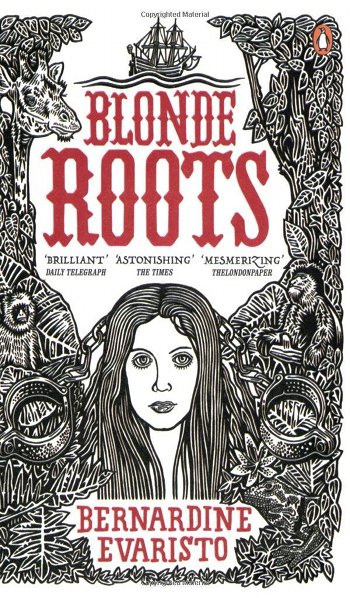 In this ambitious reimagining of the history of slavery, Bernardine Evaristo has meticulously turned every detail of the world as we know it inside out.
In this ambitious reimagining of the history of slavery, Bernardine Evaristo has meticulously turned every detail of the world as we know it inside out.
In transforming white people into wiggers enslaved by the blaks she has done far more than show us the impact slavery had on an entire race of people – she has made us feel what they felt, see their surroundings through their eyes, feel their sense of inferiority foisted upon them by generations of being told that they were weaker, less intelligent, less capable of emotion, simply less than mankind.
Blonde Roots‘ narrator is Doris, a “yellow-headed stalk of a girl” stolen from her life in England at the age of ten while playing hide and seek with her sisters. Through flashbacks interwoven with scenes of her life as sugar baron Bwana’s top slave, Bernardine illustrates a rich, glorious world where the blaks are in charge, where plump flesh is desirable and slimness considered ugly, where topless fashions are the norm, where every mouthful of food is spiced and Brussel sprouts and cabbages are considered exotic.Doris, renamed Omorenomwara by her owners, survives two decades of slavery before making her first real attempt to escape – a venture fraught with dangers, from the risks of being caught and having her feet chopped off, to the threats of the jungle teeming with poisonous reptiles and vicious beasts.
Bernardine’s wry, often humorous tone keeps Doris’ self-pity at bay, while her talent as a poet shines through to turn darker scenes into visions of stark beauty. Months after a brutal whipping that almost killed her, Doris reaches behind to touch her scarred back for the first time, “running cautious fingers across its grooves and cavities.”
As the subject matter demands, there are moments of sheer horror, but Bernardine has a Tolkein-esque mastery of balance so that just as I can’t bear Doris’ exhaustion and agony a moment longer, she treats us to a vision of the slaves’ quarter on a Sunday, painting a vibrant scene of colour, laughter and a myriad of flavours.
A third of the way through the book, we unexpectedly lose Doris’ narration and Bwana takes over for a while – at first I was nonplussed but soon realised that Bernardine was using his voice to show how the slavers reconciled their actions, with scientific explanations of how the lucrative slave trade was in fact “a Mission of Liberation – the Saving of Souls.”
This decision to allow Bwana to tell his side of the atrocious story reveals Bernardine’s ability to create truly three-dimensional characters – even the most reprehensible are capable of engendering empathy. It reminds us that many slave traders were less evil than simply misinformed. They believed what they had been taught, in the same way that today most of us are brought up to believe that all people are equal. It makes emancipation all the more remarkable.
In fact Bernardine’s first prose novel is a celebration of human nature, as well as a stark warning – it lauds human resilience, hope, loyalty and adaptability, and the ability to make a life in the direst of circumstances.
Blonde Roots by Bernardine Evaristo is published by Penguin and is available to buy from Amazon.
To submit or suggest a book review, send an email to Judy(at)socketcreative.com.
